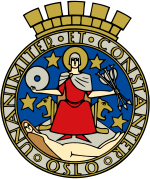Kristiania Kommunale Sporveie
 |
|
| Municipal owned | |
| Industry | Transport |
| Fate | Acquisition |
| Successor | Kristiania Sporveisselskab |
| Founded | 1899 |
| Defunct | 1905 |
| Headquarters | Oslo, Norway |
| Parent | Oslo Municipality |
Kristiania Kommunale Sporveie or KKS, colloquially known as the Red Tramway (Norwegian: Rødtrikken) was a municipal owned company that operated parts of the Oslo Tramway from 1899 to 1905. KKS built and operated three lines, Sagene Ring, the Rodeløkka Line and the Vippetangen Line. The three were connected by means of lines of Kristiania Sporveisselskab (KSS) and Kristiania Elektriske Sporvei (KES). KKS bought twenty motorized trams from Schuckert & Co. and twelve trailers, designated as Class S. It built two depots, Sagene and Rodeløkka.
The company was created after a political shift whereby the municipal council decided to start operating trams. The company operated a mix of line services, most of the lines operating every ten minutes. KKS failed to make a profit. After the 1904 elections the majority in the municipal council shifted. The company was privatized in May 1905 and sold to KSS after the municipal council had rejected purchasing the very same company.
By the late 1890s Oslo had three private tram companies, of which two, Kristiania Sporveisselskab and Kristiania Elektriske Sporvei, operated each their network of street trams. This led to a debate of whether tram operation should be a private or a municipal affair. The two dominant parties too each their stand: the Conservative Party wished to retain the private operations, while the Liberal Party supported a municipalization of the operations. The issue was split: Oslo Municipality taking over the existing two companies and establishing a new company to operate new lines. The municipality had in 1896 been offered to purchase KSS for its nominal share value plus interest in a move initiated by the tram company itself. Its main concern was its concession would expire in 1905 and that the municipality would then have the right expropriate it. Meanwhile, the company was in need of new capital and offered to issue new shares to the municipality. Oslo Municipality rejected the offer and the new shares were instead sold to Gesellschaft für elektrische Unternehmungen of Berlin.
...
Wikipedia
